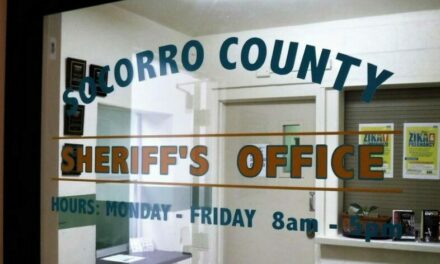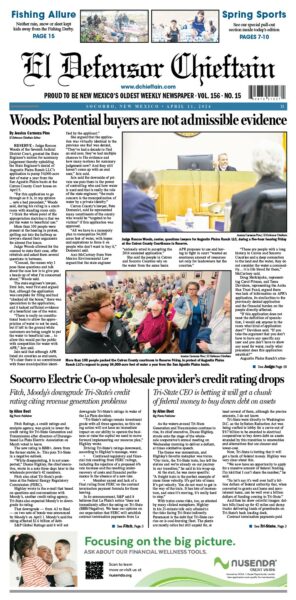The Socorro County Board of County Commissioners has voiced its opposition to the content of two bills considered during the legislative session; the Anti-Pyramiding Provisions proposed in House Bill 367 “Gross Receipts Rates & Professional Services,” and Senate Bill 11, “The Paid Family & Medical Leave Act.”
The actions were taken during a special county commission meeting on the morning of March 6.
The Anti-Pyramiding Provision in HB 367 would create a gross receipts tax deduction for certain business-to-business services, a provision known as anti-pyramiding. The so-called “tax pyramiding” is when the state levies taxes multiple times on the same goods or services.
Resolution 2023-38 states that since Socorro County relies heavily on the gross receipts tax to be able to fulfill its general operating budget to fund roads, detention, law enforcement, public safety, and general services, a reduction of GRT would be detrimental to county residents.
“With every fiscal year, our budget is scarcely balanced with the current activity of our industries and GRT allocations,” the resolution states. “With a big decrease on GRT, we are going to have to search for other revenues of funding and possibly look at increasing property taxes on our citizens.”
The resolution points out that the Legislative fiscal impact report estimates that the overall loss will be in the range of $75 – $123 million, and Socorro County anticipates the direct revenue loss to the counties would be between $23 – $35 million.
The resolution states that since the Legislature provides limited authority for local governments to generate revenue through GRT taxes and property taxes, “any additional erosions or exemptions, no matter how worthy, deplete the ability of local government to provide critical services for public safety, community programs and indigent care, create economic development opportunities, and leverage funding for infrastructure.”
One concern of the County is that the decision to reduce gross receipts tax revenue “will put counties in a precarious position of having to explain why we have such significant revenue shortfalls, not to mention putting us under a microscope to demonstrate that we did not use our ARPA SLFRF to make up the gap in revenues.”
In addition, the County does not want to jeopardize the $407 million in relief funds received by the counties because “someone wasn’t paying attention to these types of statutory restrictions,” and the proposal of elimination of GRT taxes on certain professional services will have a tremendous impact to the revenues of Socorro County as well all other Counties.
In addition to the Anti-Pyramiding Provisions Proposed in HB 367, the Board also opposed an alternative request that the state only makes tax adjustments to the state’s base rate.
With two commissioners – Joe Gonzales and John Aguilar – absent, the resolution passed by a 3-0 vote.
HB 367, “The Gross Receipts Rates & Professional Services” bill has been sent to House Taxation and Revenue Committee.
As for Resolution 2023-37, the commission believes Senate Bill 11, The Paid Family and Medical Leave Act, conflicts with and duplicates the federal Family Medical Leave Act. A Paid Family and Medical Leave Act would provide up to 12 weeks of paid time off for employees who request it for a serious medical condition, caring for a family member with a serious medical condition, or welcoming a new child.
In opposing the PFMLA, the commission holds that “not only is the bill unconstitutional for the County but it will unduly burden the government of the County of Socorro as well as all of the small businesses that are the backbone of the County’s economy, foreseeably harming employment and driving small businesses out of business.”
The act would require employee contributions of 0.5 percent of employer contributions and 0.4 percent of employee wages, according to the county.
Citing the Fiscal Impact Report of the neutral Legislative Counsel Service, the resolution states that increasing payroll taxes “also may impact businesses’ demand for labor, as well as the supply of labor. In a tight and competitive labor market like New Mexico experienced in 2022 and into 2023, these taxes are more likely to be carried by the employer, making hiring new and keeping existing workers more expensive and burdensome.”
It further states that “increasing payroll taxes also may impact businesses’ demand for labor, as well as the supply of labor. In normal labor markets, payroll taxes are typically passed on to employees, effectively lowering the take-home pay of workers.”
The resolution again refers to the FIR which says that the “reporting and administrative requirement outlined in the bill may present excess burden on business owners, state agencies, and other eligible places of work, especially smaller businesses and those without a full human resources department or staff.”
The resolution also points out concerns related to the anti-donation clause in the New Mexico Constitution, which includes an exemption for sick and indigent persons.
“Because of the bill’s broadly defined eligible use categories, many people using PFMLA would not be sick or indigent, leaving the state open for anti-donation related lawsuits,” the resolution says, “However, there are other examples of programs or tax expenditures that do not meet this test, such as recently enacted tax rebate programs.”
The resolution passed on a vote of 3-0, with commissioners Joe Gonzales and John Aguilar absent.
SB 11 was passed by the senate and then sent to the House Commerce and Economic Development Committee last week.



















